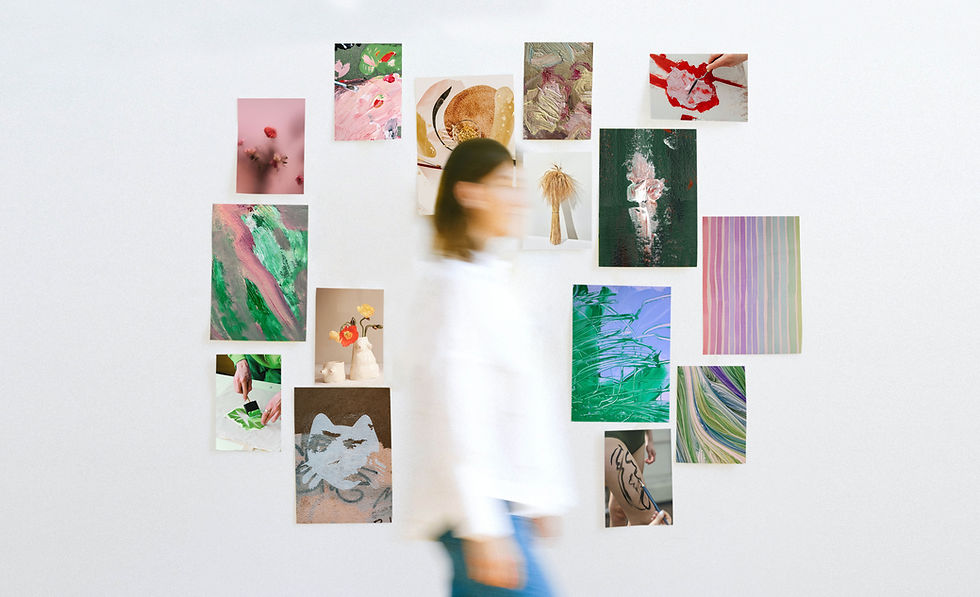Navigating the Art World: Recognizing Harmful Galleries and Finding Supportive Art Businesses
- Mallory Shotwell

- Sep 10, 2023
- 3 min read

The art world is a diverse and vibrant realm, offering artists the opportunity to showcase their creations, connect with audiences, and establish themselves in the industry. However, not all galleries and art businesses have artists' best interests at heart. Some perpetuate low wages, a low standard of care, or even poor treatment, leading artists to feel exploited and undervalued. In this article, we'll delve deeper into how to spot harmful art businesses, handle such situations, and ultimately find galleries that prioritize artists' well-being and success.
Identifying Harmful Art Businesses:
1. Unrealistic Promises:
- Spotting It: Galleries that promise instant fame, fortune, or guaranteed sales without substantial effort on your part are often too good to be true.
- What to Do: Approach any gallery that over-promises with skepticism. Research their track record, ask for evidence of past successes, and consult with other artists who have worked with them.
2. Lack of Transparency:
- Spotting It: If a gallery avoids discussing contracts, fees, or sales details openly, it could be a red flag.
- What to Do: Insist on transparency. Request clear and comprehensive information on fees, terms, and how they handle sales. Any hesitation to provide this information may indicate dishonesty.
3. Exorbitant Fees:
- Spotting It: Galleries that demand high upfront fees or have hidden costs can leave artists financially strained.
- What to Do: Evaluate whether the costs align with the potential benefits. If fees seem disproportionate to the exposure and support provided, consider other options.
4. Unfair Contracts:
- Spotting It: A contract that heavily favors the gallery's interests over yours, including demanding exclusive rights to your work, can be detrimental.
- What to Do: Have a legal professional review any contract before signing. Negotiate terms that are fair and mutually beneficial. Avoid exclusivity unless the terms are favorable to your career.
5. Neglecting Care:
- Spotting It: Galleries that mishandle artwork, fail to properly store or transport it, or show a lack of professionalism in presentation can harm your reputation.
- What to Do: Inspect the gallery's handling of artworks in previous exhibitions. Discuss concerns about the care of your work upfront and ensure they prioritize professionalism.
Dealing with Harmful Situations:
1. Know Your Worth:
- Spotting It: If a gallery consistently undervalues your work and offers lower-than-standard compensation, it's time to reevaluate the partnership.
- What to Do: Research industry standards for pricing and commissions. Negotiate confidently based on your talent, experience, and the effort you invest.
2. Consult with Peers:
- Spotting It: If you're unsure about a gallery's reputation, talking to fellow artists who have worked with them can provide insights.
- What to Do: Connect with artists who've had experiences with the gallery and ask about their experiences. This can help you make an informed decision.
3. Seek Legal Advice:
- Spotting It: If you suspect exploitation or unfair treatment, consulting with a legal professional experienced in art law is essential.
- What to Do: Present your concerns and any relevant documentation to the lawyer. They can advise you on your rights, potential breaches of contract, and available courses of action.
4. Open Communication:
- Spotting It: If you notice issues with the gallery's communication or treatment of your work, addressing it directly and via email is crucial.
- What to Do: Initiate a candid conversation with the gallery's management. Express your concerns professionally and seek solutions that benefit both parties.
In worst cases, predatory behavior might involve a gallery pressuring you into accepting a commission with unreasonable terms or exploiting your time and effort. If a stipend or payment doesn't adequately cover the full cost and effort involved, it's important to decline or negotiate for fair compensation.
Artists must be vigilant in identifying harmful galleries and businesses in the art world. By recognizing warning signs, consulting peers and professionals, and standing up for fair treatment, artists can avoid exploitative situations. Pricing commissioned pieces requires a comprehensive assessment of time, effort, and costs involved, ensuring that your work is properly valued. The art world should be a supportive and respectful environment that values artists' contributions and fosters their success.




Comments